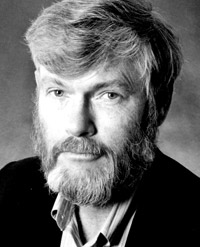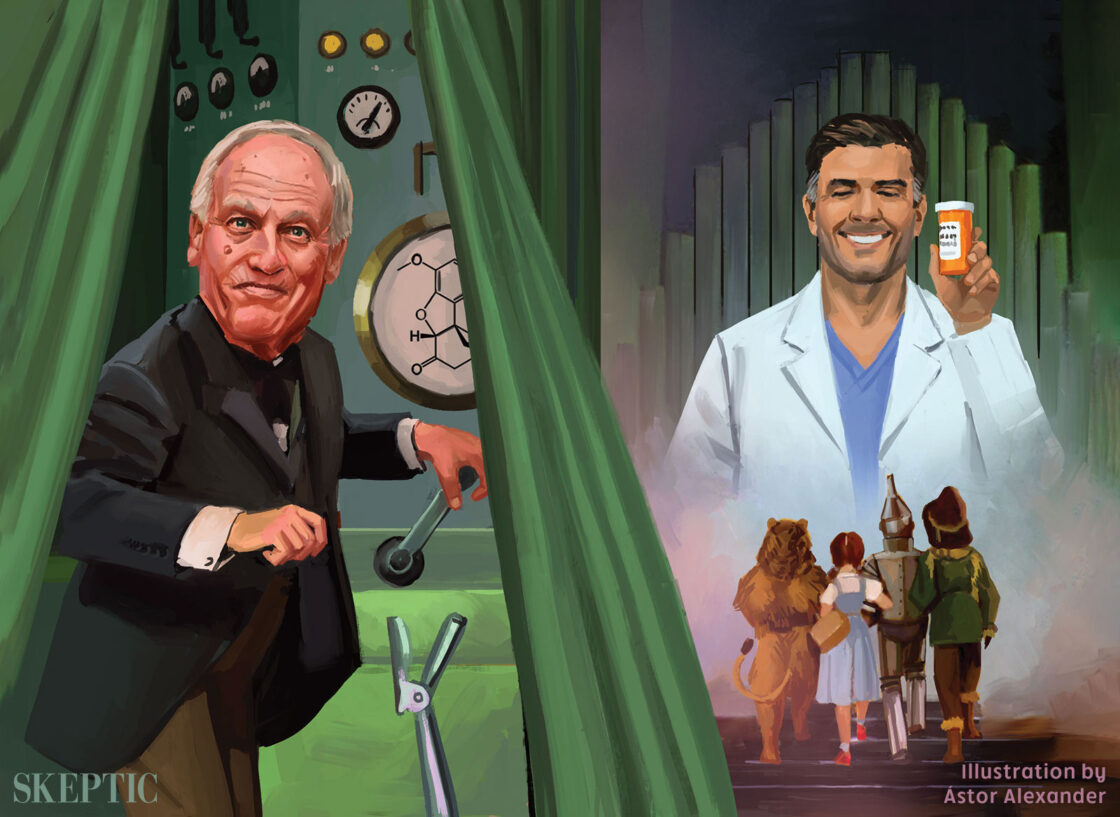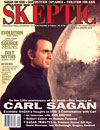
Greg Benford is a professor of Physics, U.C. Irvine and the author of Timescape and many other books.
In the early 1990s the national academy of Sciences held its annual election to membership. Richard Feynman had already become so exasperated that he resigned his membership, saying that he saw no point in belonging to an organization that spent most of its time deciding who to let in.
But this time the best known astronomer in the world was nominated. Each section of the Academy votes separately on all candidates, and the astronomy division voted the fellow in. But there were negative votes from other divisions, notably the particle physicists. They disliked his public persona, some said. They complained that he was arrogant and an egomaniac, and said he was really not up to caliber, despite his fame. Clearly, envy played some role. Rumors flew.
Rarely is a candidate turned down, but it happened that time. So it is that Carl Sagan was not a fellow of our National Academy.
World famous, principally for Cosmos, he had done solid work on planetary atmospheres since the early 1960s. After the National Academy rebuff he increasingly spent his time taking science to the greater world.
Many scientists don’t think much of such endeavors. But the opposite of popularized science, in the long run, is unpopular science.
We see that daily, in the scare-’em-with-science strategies of Hollywood movies, doomcryer personal liability lawyers, environmentalist Chicken Littles, and the many political tribes who seek new threats in every fresh technology. (I make these comments as a member of about half a dozen environmental groups, too.) All these groups have legitimate issues, but the scary aspects of science are played to the hilt — because it works. Metaphorically, I suppose one could say that once we were a nation of Robert Heinlein fans, and now we’re a country of Stephen King readers.
We Americans, once the embodiment of Yankee ingenuity, have a national schizophrenia about science. We love its wonders, hate its threats, dread its manifest power.
Much of this comes from a public that simply doesn’t know much science, or even how scientists think. Films and TV routinely get away with mammoth plot boners. Radiation can create giant insects, or it will make you grow an extra head. Viruses spread instantaneously, even through hard vacuum. Spaceships bank and rumble like fighter planes. Mutations cause super powers — the list goes on.
If only the low levels of media were affected, fine. But we have an administration that just vetoed funding for stem cell research, and a notorious Kansas school board that wants Intelligent Design taught alongside evolution. Codes written by politically-influenced lawyers set contamination standards higher than the purity of rainwater, so nature itself is “polluting” Lake Michigan. Dollars get wasted on absurd safety requirements, while elsewhere people die of want. Politicians consult horoscopes.
What can scientists do about this? Patiently try to get through to the broad public with the truth. Sagan fought this battle well. He provided a step-by-step hypothetical reasoning primer called “the baloney detection kit” that readers could use to evaluate questionable claims. Pseudoscientific concepts such as astrology, crystal healing, and alien abduction were, in Sagan’s view, ultimately mind-numbing appeals to authority. Believe this without evidence; hey, it will make you feel better.
In one of his last books, Sagan resurrected the Enlightenment metaphor of reason as a candle shining into the darkness of the universe, empowering individual human beings to think freely and take control of their own destinies.
But the National Academy insult stung. Carl is gone, but we scientists are left with the problem. Who has replaced him? No major interpreter of astronomy has taken his place. Indeed, there is no widely recognized scientist in our popular discourse. At least we have many good writers about science — E.O. Wilson, Richard Dawkins, John McPhee, Neil Tyson, Stephen Weinberg, Brian Greene, Lisa Randall, others. Note they are mostly biologists and field theory folk, two recently geewhiz subjects. They’re mostly men, too.
But few of these undertake major TV productions, testify before Congress or draw a crowd the way an even minor rock star or politico does. Why?
Partly it’s about skills. Few possess good media savvy. Few invest the time to cultivate those in the media culture. Not many rub shoulders with the culture that equates “intellectual” with “humanism.”
Then there lurks the upper level of science itself, a fairly snooty club mostly based in the east coast. As a graduate student I asked Jacob Bronowski how his television series, The Ascent of Man, had been received at our university, UCSD. “I have the feeling they’d rather I hadn’t,” he said rather crisply. When I asked a prominent particle physicist what would happen if Sagan were alive and came up for an Academy vote again, he said, “The same.”
Unless the culture of research science realizes that it may be a major stumbling block to its own popularity, we’ll remain part of the problem, too.
This article can be found in
volume 13 number 1
The Legacy of Carl Sagan
this issue includes: An Interview with Ann Druyan; Science, Religion & Human Purpose; An excerpt from Conversations with Carl; Tributes to Carl Sagan…
BROWSE this issue >
This issue is sold out.
This article was published on October 29, 2009.


















Forty years ago, as an Assistant Scientific Officer (i.e. a nobody) at Harwell in Oxfordshire – I wrote a letter to Carl Sagan – this was in the days before e-mail existed. I had just seen Carl on a BBC programme and he had been clearly “set up” by a couple of lackluster U.K. scientists who brought up something that he had casually mentioned over lunch and they had tried to “trip” Carl up. Completely unperturbed, Carl responded in a polite and accurate manner which made the two protagonists look like complete idiots (which they were of course). I was highly impressed. So impressed that I wrote to him, referring to the unpleasant incident on U.K. T.V. You cannot imagine my joy, amazement, and surprise at receiving a reply from Carl :) Cornell headed paper and Carl’s signature at the bottom, I couldn’t believe it. Arrogant? Egomaniac?? I don’t think a person who answers to these personality traits would actually take the time to reply to a 19 year old kid he’d never heard of across the pond. Carl was, and still continues to be a great inspiration to me, and to countless others, showing us how a good, true scientist, should live their life. Miss you Carl Sagan :(
“They claim he was arrogant and an egomaniac…” writes Prof. Benford. Right on, you claimants! In 1980 I had a corroborating encounter with Sagan at an invitation-only cocktail reception for the Great Man held at the NAS building in Washington. I was, at the time, an Assistant to one of the FCC Commisioners. My boss had dragooned me into attending in his stead. I also brought his secretary, Bonnie, who had a tremendous crush on Sagan. The attendees were first subjected to a preview of his new public TV show which drew an occasional derisive cat-call from the mostly scientist group. Lots of shots of the Great Profile of the Great Man with his Sassoon hairdo stepping out into the galaxy.
When the show mercifully ended, Sagan worked the reception room. When he came to us, I thought I’d sincerely compliment him of his recently published (and truly excellent) “Boca’s Brain” in order to give him some face time with Bonnie. The conversation went like this:
Me: “Hi. I just finished “Boca’s Brain.” It was terrific. But didn’t you get a lot of flack from the neuro-physiology community — as an astronomer writing about their field.”
Great Man: (Literally turns beet red with anger and bellows) Nobody gives ME any flack. (with that he abruptly pivots on his heels and stalks away, fuming).
@6 Raymond Dujack
I thought the usual scientific standard when making assertions of one sort or another was solid, multiple lines of evidence. In this case, it seems that a solitary encounter with an obviously irritated (perhaps due to the reception of his show?) Sagan is taken as proof that he was an arrogant egomaniac.
Basing an entire assessment of a person on a single encounter is nothing more than guesswork. I have been embarrassingly guilty of this once or twice myself, before subsequently discovering that the person is actually quite reasonable and I met them at a bad moment.
@Dujack
Here’s my theory…you had your own crush on Bonnie and were jealous of Sagan from the start because she was star-struck and wouldn’t give you a second glance. Why else would you pay such a backhanded compliment to her idol except to bring him down a notch or two in her eyes? You obviously couldn’t impress Bonnie with any accomishment of your own, so you were left with the pathetic act of tearing someone else down to build yourself up. Backfired, didn’t it? Bonnie simply resented you for spoiling her encounter with Sagan, didn’t she? And that’s why you still harbor this petty grudge after thirty years and long after this truly great man has passed away.
How’s that for unscientific speculation?
Indeed no one has taken his place. The gulf widens. More than 3 decades on, and the first 5 minutes of the original Cosmos remains the most inspiring introduction to any subject in the history of television or film.
A few additional points: Even though the National Academy of Sciences as a whole rejected Carl Sagan as a member, which gave it a black eye that it still has, it did this only because of the pettiness of some of its members. The leadership of the National Academy of Sciences, on the other hand, gave Sagan its highest award, its Public Welfare Medal. Keep in mind also that Velikovsky is far from the only “scientist” whose ideas sparked popular interest but were rejected because they weren’t based on science or were based on faulty science. Finally, as balance, some so-called crackpot scientists whose ideas are initially rejected wind up overturning our notions of the universe, the world, and reality. Sagan wasn’t an Einstein or Bohr, but he was more than a science educator, important though that it. He also made contributions to astrophysics’s body of knowledge.
This comment suggesting that Carl Sagan’s was denied membership in the National Academy of Sciences because of his criticism of the views of Immanuel Velikovsky is almost as crackpot as the views of Immanuel Velikovsky. One of Sagan’s most insightful contributions to thinking about science among the more enlightened general public is encapsulated in his statement, “Extraordinary claims require extraordinary evidence.” Velikovsky’s extraordinary claims about close contact in ancient times of the Earth with Mars and Venus were based on the opposite, on non-science, on his poor understanding of how celestial mechanics works. That’s the reason the scientific community has rejected his ideas. The National Academy of Sciences rejected Sagan as a member, on the other hand, because of petty jealousy, with there being solid evidence of such pettiness in the scientific community.
If for no other reason, Sagan’s membership should have been rejected for his unscientific attacks on Velikovsky in the guise of scientific objectivity Sagan was less than straightforward in his critique of Velikovsky’s work, and that the scientific establishment treated Velikovsky shabbily, with Sagan leading the underhanded attack. Sometimes what goes around comes around.
I only wish I had heard of Carl Sagan when I was at LSU in the mid 80’s trying to figure out what I wanted to major in. Much later, my son introduced me to the Cosmos series. I have watched it several times and to this day, when I have a hard time getting to sleep, I will turn the sound down low and let Cosmos lull me to sleep. Thank you Carl.
Poor Dr. Sagan.
He has inspired many great, bright people. His voice is calming and eloquent. Any organization that would not support him is not worth being a member. How could any one reject a man who pushed science education?